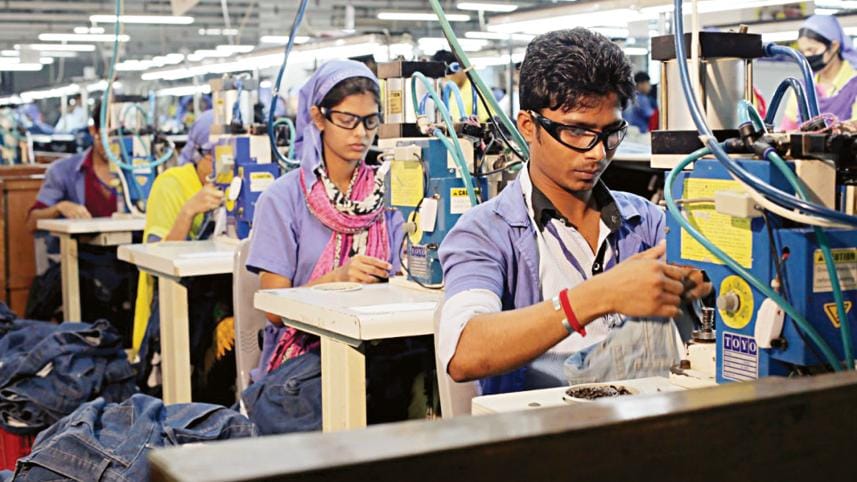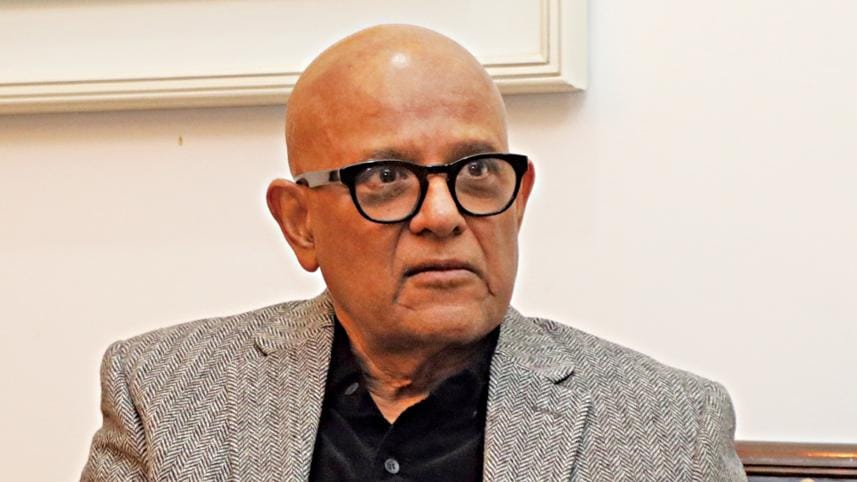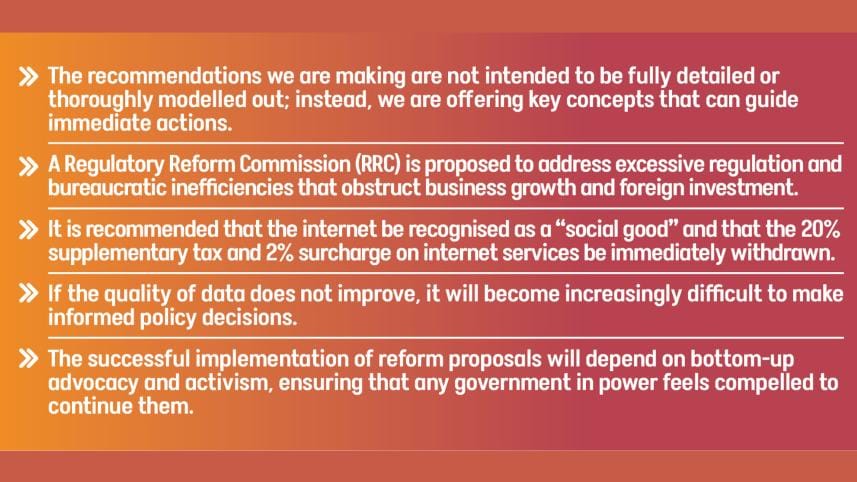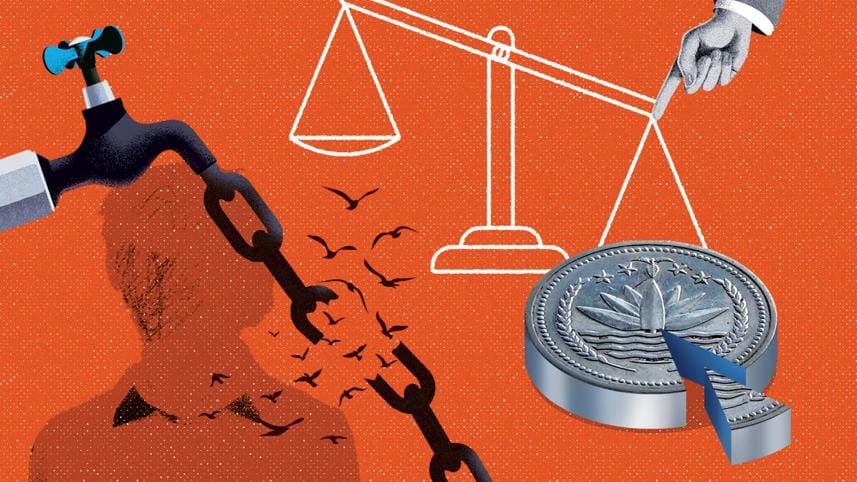Human welfare must be at the centre of development thinking

The Daily Star (TDS): What is the scope of responsibilities defined for the Task Force on Redesigning Economic Strategy?
KAS Murshid (KASM): Our task force was mandated with the responsibility of rethinking economic strategy and recommending policies and interventions in the short and medium term. Our intention was to propose pragmatic, actionable interventions with a strong public interest component.

There are numerous initiatives that cannot be completed in the short term. We felt that we should identify measures that could be acted upon almost immediately—the "low-hanging fruits"—in addition to policies that are urgent but need to be anchored within a longer timeframe.
Our report consists of two parts: Part I examines sectoral issues, while Part II focuses on cross-cutting issues. The sectoral discussions include macroeconomics, trade, agriculture, industry, education, and health, while the cross-cutting issues address critical concerns such as food and energy security, leveraging digital and AI technology, reducing the digital divide, reforming the planning process, combating everyday extortion, and improving government efficiency.
One of the main challenges we identified is diversification. We aimed to address diversification in agriculture, industry, and manufacturing, as well as in exports. These areas are vital, and our work involves identifying where policy adjustments can support and encourage diversification. While some issues can be addressed through policy changes, others require additional support, such as improvements in infrastructure or energy.

We have proposed recommendations to reduce income and wealth inequality, including a progressive tax system, improved education and skills development, expanded financial inclusion, stronger social safety net programmes, labour market reforms, regional development, good governance, gender equality, innovation, and increased public awareness.
Moving forward, I believe human welfare must be at the centre of all development thinking. Although export growth, foreign reserves, technology, and services are essential, they must be seen as tools to facilitate human development. To expand and nurture this, we need to invest in skills, capacity, the physical and social environment, and a well-functioning, competitive market backed by an efficient governance regime. For a resource-poor country like ours, our most significant asset is human capital. Therefore, our best strategy is to focus on building human skills and capacities. This is the perspective the task force has adopted.
TDS: Could you provide an overview of the key initiatives you intend to implement, including those aligned with the economic white paper, as well as a detailed plan and timeline?
KASM: The issues outlined in the white paper have resonated with us. The white paper highlights several critical concerns: poor governance, high levels of corruption, mismanagement, significant money laundering, inflation, high unemployment, and a particularly alarming rate of graduate unemployment. It also points to a lack of skills, a shortage of dollars, depleted reserves, and insufficient gas supplies. These are the pressing challenges we currently face.
The white paper primarily evaluated the actions of the previous government. The task force, on the other hand, has drawn up a list of policy interventions in critical areas of the economy that could be implemented relatively quickly. There is no contradiction between the two reports.

We have recommended launching pilot projects to develop scalable governance models for future reforms, such as selecting a public hospital, a community clinic, the Bangladesh Road Transport Authority (BRTA), and even an entire ministry for comprehensive reforms. Reviving the Buriganga River has been identified as a high-priority project to prevent its extinction.
Additionally, we have proposed establishing several new institutions, such as a Centre of Global Excellence in STEM, Engineering, ICT, and AI, and a Centre for Social and Behavioural Change Communication and Research. The former will help position Bangladesh as a regional hub for advanced research and studies in STEM, while the latter will assess behavioural patterns and dynamics that promote or constrain socio-economic development.
Given Bangladesh Biman's failure to meet modern aviation standards, the task force suggests establishing a new airline, tentatively named Bangladesh Airways. This new airline would utilise half of Biman's existing assets but would be managed by an independent, world-class management company.
To address the urgent need for tax and customs reforms, we call for the National Board of Revenue (NBR) to expedite its automation process. We also recommend the establishment of an independent, high-powered oversight body to drive these changes. A Regulatory Reform Commission (RRC) is also proposed to tackle over-regulation and bureaucratic inefficiencies that hinder business growth and foreign investment. The commission would monitor, evaluate, and streamline regulations across various sectors, improving the ease of doing business in Bangladesh and attracting both domestic and foreign investment.
For urban transportation, the task force recommends implementing automatic traffic signalling and transitioning to a single-operator bus franchise system. The report also suggests opening up the health sector to foreign investment, waiving cash-out fees for remittance earners, recognising the internet as a "social good," and immediately withdrawing the 20% supplementary tax and 2% surcharge on internet services.
The closure of the Indian medical market has highlighted the need for high-quality healthcare within Bangladesh. To meet this demand, liberalising foreign direct investment (FDI) in the health sector is essential. This move would reduce the need for expensive medical tourism abroad, foster competition, and improve healthcare services in the country.
Selected polytechnics could be upgraded to technical colleges, offering a two-year BA (Tech) degree to equip students with the necessary competencies and help eliminate the perception of an "inferior" academic degree associated with polytechnic certificates. In other words, technical education requires gentrification.
In line with efforts to diversify exports, the task force proposes "cherry-picking" high-potential firms for policy, financial, and technical support. This approach targets selected non-RMG (ready-made garment) export performers from approximately 1,500 entities currently exporting a minimum of $1 million annually.
Further recommendations include enhancing the one-stop service system, revitalising Special Economic Zones (SEZs), implementing NID-based open data platforms similar to India's Aadhaar card, and removing political influence from the banking sector.
Our tasks aim to drive meaningful change, laying the foundation for a resilient and progressive society while addressing key issues that affect citizens' daily lives. Ultimately, the actions outlined in the report serve as an initial roadmap for economic reform, offering a vision for a transformed Bangladesh that is responsive to the needs of its people.
TDS: What challenges are you encountering in implementing these initiatives?
KASM: One of the primary constraints we face is the limited time available under the interim government. While there are numerous goals we wish to achieve, it is not feasible to accomplish them all within such a short period. Reform processes take time, and our plans must reflect this reality.
Our objective is not to develop a detailed, comprehensive plan but to highlight pragmatic, reasonable actions that can be implemented in the short and medium term. The recommendations we are making are not intended to be fully detailed or thoroughly modelled out; instead, we are offering key concepts that can guide immediate actions.
Our country has never had a clear and specific economic strategy. In the past, terms like "export-led growth" have been used as objectives, but these kinds of invocations have not served us well. Our actual growth has not been export-driven, and the gap is evident in the small ratio of exports to GDP.
One important perspective we aim to introduce is that, before initiating any reform, we should not spend excessive time on highly detailed plans. Many of these issues have already been thoroughly considered, so there is no need to reinvent the wheel. We should begin the reform process by taking concrete steps, starting with a few essential actions.
A significant issue we have identified is the lack of appropriate leadership in many institutions. We have seen instances where technocratic positions are filled by individuals without relevant expertise, such as recruiting someone with a background in history or English for a highly technical role. Our aim is to identify such gaps and bring about leadership changes to ensure that qualified individuals are in the right positions.
In addition, we propose the establishment of a monitoring and evaluation system to track progress in real time. This system should be accessible to policymakers and provide a mechanism for public feedback. The feedback process should be twofold: initially online, followed by a paper-based system.
One specific issue we want to address is food security. Given our reliance on imports for essential goods, it is crucial to maintain reserve stocks of critical items like fertiliser, petroleum, and edible oil. Without this, we risk becoming vulnerable to shifts in the global market. In the short term, we must ensure that reserves are established to safeguard against such dependencies. In the long term, however, we must consider strategies for reducing this reliance through import substitution. This is the kind of strategic thinking that we aim to foster.
TDS: What mechanisms does the task force plan to recommend for institutionalising the reforms and ensuring their long-term sustainability, regardless of regime changes?
KASM: This is largely beyond our jurisdiction. However, I believe that if we initiate meaningful reforms and demonstrate their positive impacts, public pressure will grow to sustain these changes. Timing is crucial in this process. While more time would have allowed us to achieve more, within the available time frame, we must make every effort to begin and practise these reforms. Successful implementation will depend on bottom-up advocacy and activism, ensuring that any government that comes to power will feel compelled to continue them.
We are also suggesting the digitalisation of various sectors to promote greater transparency. Through digital platforms, citizens could track progress, organise efforts, and suggest improvements. One of the chapters in our report focuses on youth-led citizenship, highlighting the importance of young people's involvement in positive activism.
TDS: Given the significant manipulation of macroeconomic data during the past regime, how does the task force plan to rebuild trust in public data and ensure its integrity moving forward?
DKASM: Rebuilding trust is a slow process that will take time. A central issue we face is government interference. However, if institutional leadership is strong enough to resist such incursions, it could foster long-term progress.
A significant challenge is trust in data. It is common for people to distrust data while relying on even more unreliable sources, such as social media. This, in my view, is a national issue. If the quality of data does not improve, it will become increasingly difficult to make informed policy decisions. There are alternative data sources available, such as the Household Income and Expenditure Survey, which could be reliable. Additionally, research organisations provide valuable panel data, and Demographic and Health Services offer data that is considered of good quality. Therefore, it is crucial to triangulate data from different sources, including various primary surveys carried out by research bodies. If a significant mismatch is observed, researchers must alert us.
A concern is that many of these data or reports were prepared with donor financing, and key donor agencies like the World Bank have worked closely with the Bangladesh Bureau of Statistics. Despite this collaboration, the emergence of such large alleged gaps in data raises questions. Since 2020, data mismanagement appears to have accelerated, which suggests that while actual data may eventually surface, those involved could claim they were coerced into the mismanagement. Ultimately, everything hinges on political commitment—if politicians are unwilling to address these issues, they will remain unresolved. Researchers may raise their concerns, but without political will, their voices go unheard.
To address this, we must build a culture of trust, accountability, and professional conduct. Supervisors must be held responsible for poor data management, particularly those in government.
The interview was taken by Miftahul Jannat.




 For all latest news, follow The Daily Star's Google News channel.
For all latest news, follow The Daily Star's Google News channel.
Comments